Authentic Mapo Tofu – A Sichuan Classic (VIDEO)
This post may contain affiliate links. Please read our disclosure policy.
Mapo Tofu is a classic Sichuan dish that is a combination of spicy, mouth-numbingly tingly, and savory meat sauce cooked with cubes of tofu – there’s nothing like it and it’s one of the most delicious dishes in the world!
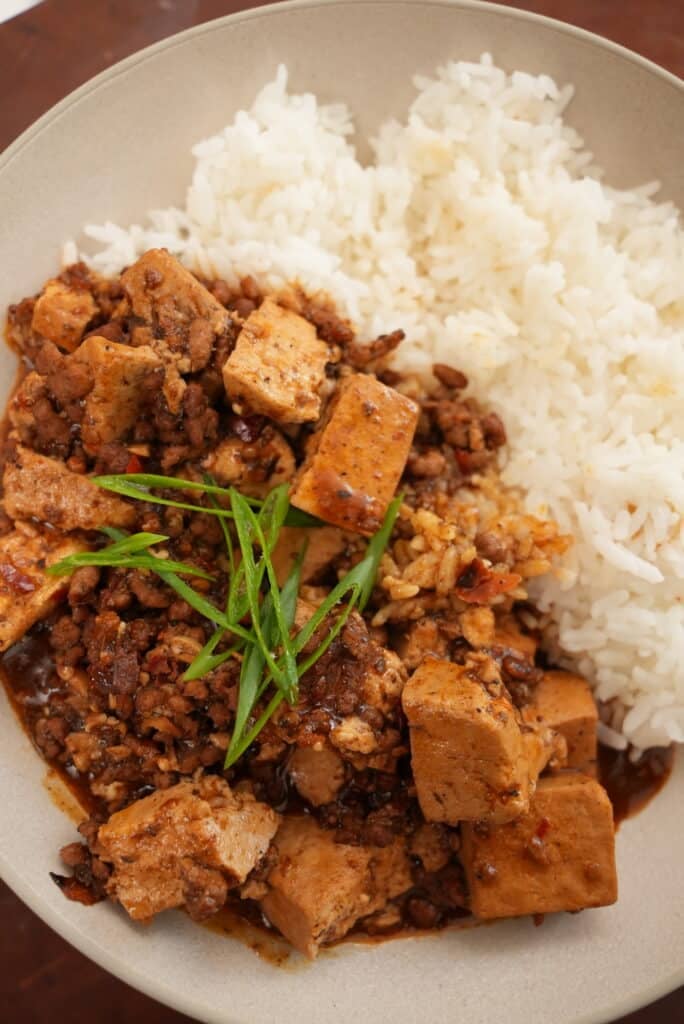
Watch the Mapo Tofu Recipe Video!
Table of Contents
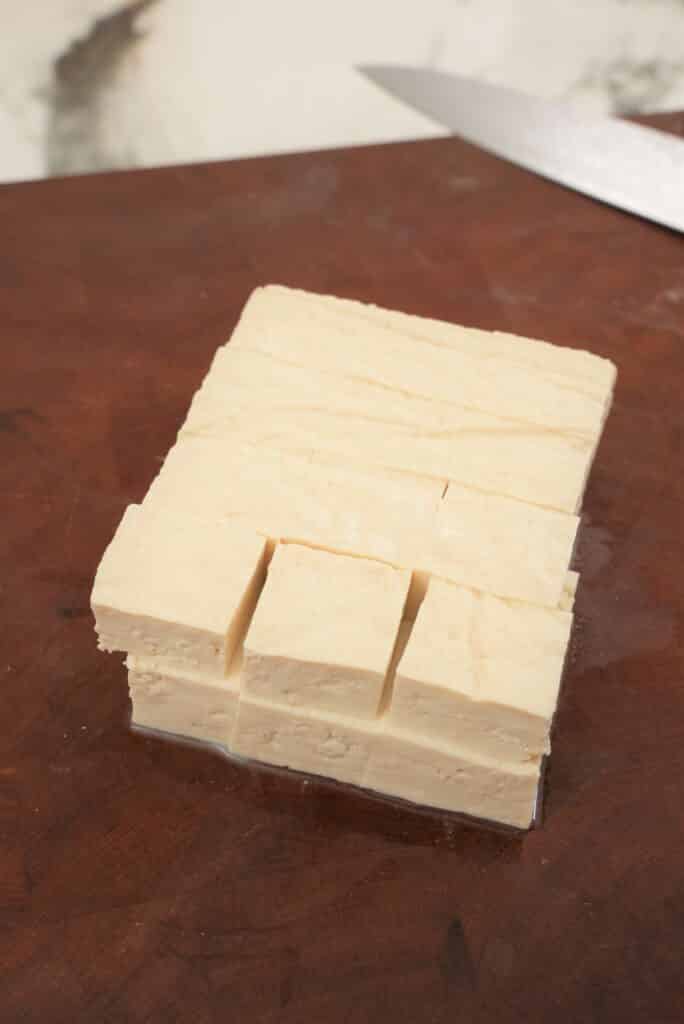
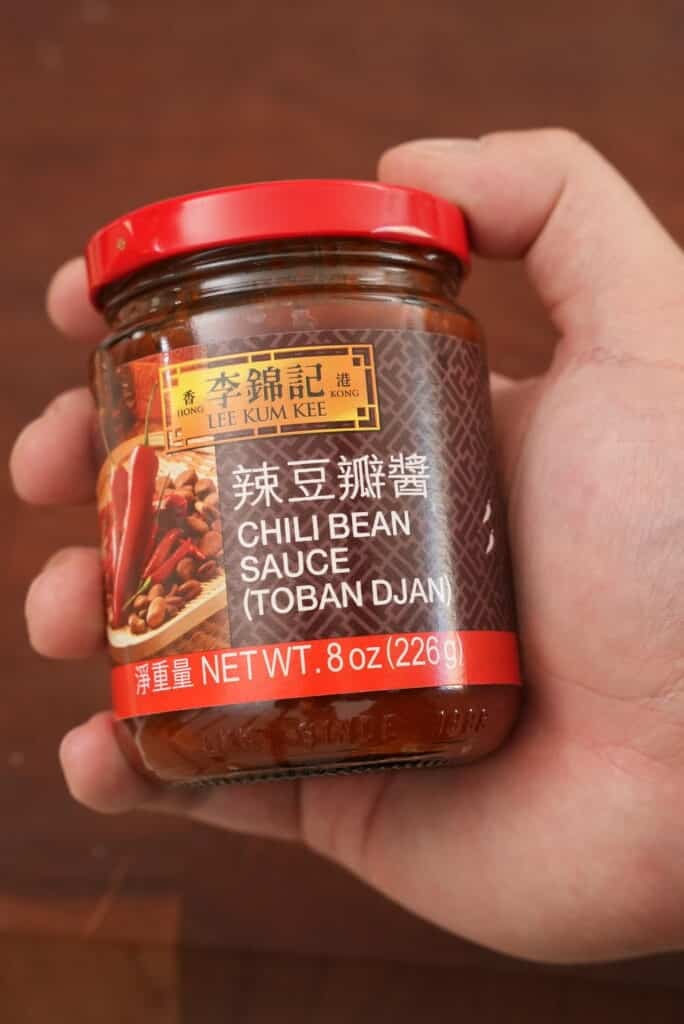
Ingredient Tips
Refer to the recipe card for the full list of ingredients and measurements!
- Firm Tofu – I used firm tofu because I like the tofu to maintain its shape while being braised (similar to Korean Braised Tofu) . If you prefer a softer texture, you can use soft or medium tofu. I cut it into 1″ or even 1/2″ cubes because it allows for a more even ratio of tofu to sauce in each spoonful. Firm tofu is also used for fried tofu dishes like Spicy Honey Garlic Tofu or Salt and Pepper Tofu.
- Ground Pork – If you cannot eat pork, you can substitute with dark meat ground turkey or chicken. If you want to make this a vegetarian Mapo Tofu, you can skip meat altogether!
- Doubanjiang – Doubanjiang is a spicy Chinese bean paste that is one of the main components to this dish. I’m including a photo of the one I like by Lee Kum Kee, so you know what to look for when you’re at the grocery store. Unfortunately, I cannot recommend a substitution. I get mine from any of the local Asian grocery stores I visit (99 Ranch, H Mart, or even Mitsuwa). You can also purchase this from Amazon.
- chili oil – I like to use my homemade chili oil! I get asked all the time what brand of chili oil is my favorite and I always say – my own! I like how I can control for the quality of the ingredients, as well as customize to my preference.
- Sichuan Peppercorn -I highly recommend grounding these by hand – I do it in my mortar and pestle. The fresher the peppercorns, the better your Mapo Tofu will taste. These are also used in Dan Dan Noodles!
- MSG – as you know by now, I love to use MSG in moderation as a flavor enhancer. This is always optional.
- Dark soy sauce – Dark soy sauce is thicker, darker, and sweeter (as well as has a higher sodium content) than regular soy sauce. If you do not have dark soy sauce on hand, you can sub with oyster sauce.
- Shaoxing wine – This is a Chinese cooking wine and one of my recommended Chinese pantry staples! I purchase mine from my local Asian grocery (99 Ranch). If you cannot find shaoxing wine, the closest substitute would be cooking sherry. If you cannot use alcohol, I would use a little bit of chicken stock.
Want super crispy tofu? Make Air Fryer Tofu instead!
Recipe Instructions
1. Prepare the Tofu
Drain the tofu from the package and then cut into 1″ cubes. You can cut these larger or smaller based on your own preference.
Once your tofu is cubed, fill a medium sized pot with water and add salt. Bring to a boil and blanch your tofu for about 2 minutes. This will help firm up the tofu, creating better texture and allowing the tofu to soak up all the delicious Mapo Tofusauce by the end.
Once the tofu is blanched, drain and set it aside.

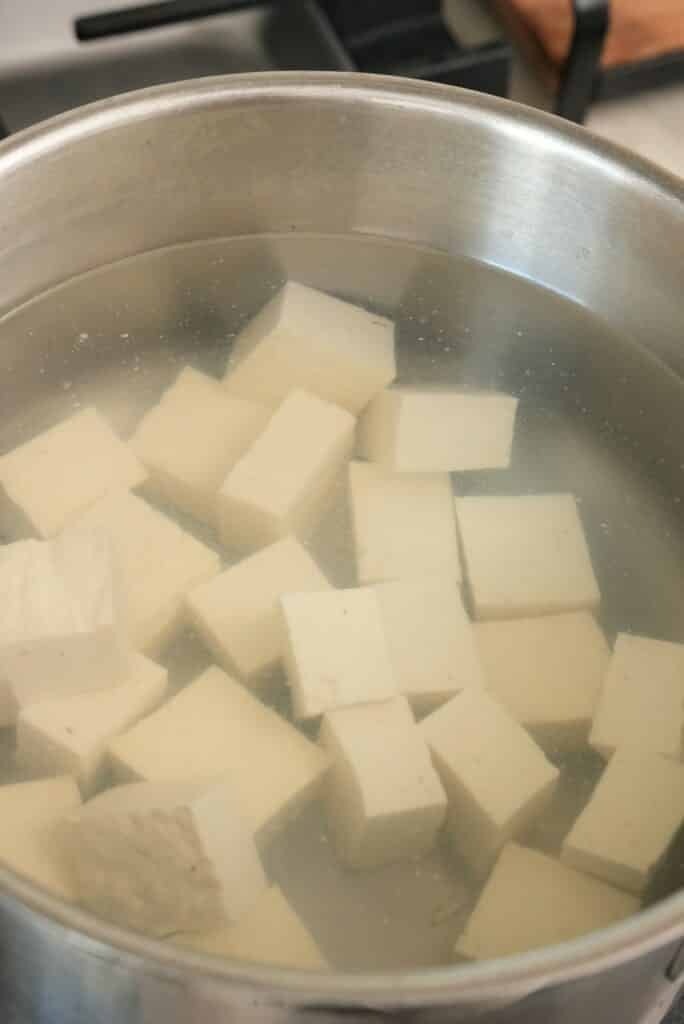
2. Brown the Ground Pork
If you are making a vegetarian Mapo Tofu you can skip this step!
In a large nonstick pan or wok, add 2 tbsp of neutral oil over high heat and brown the ground pork, until golden brown and crispy. The key here is to cook out all the water content in the pork and let the fat render out, which will then crisp up the pork very nicely, resulting in a better dish overall.
This process will take about 3-5 minutes depending on your stove.
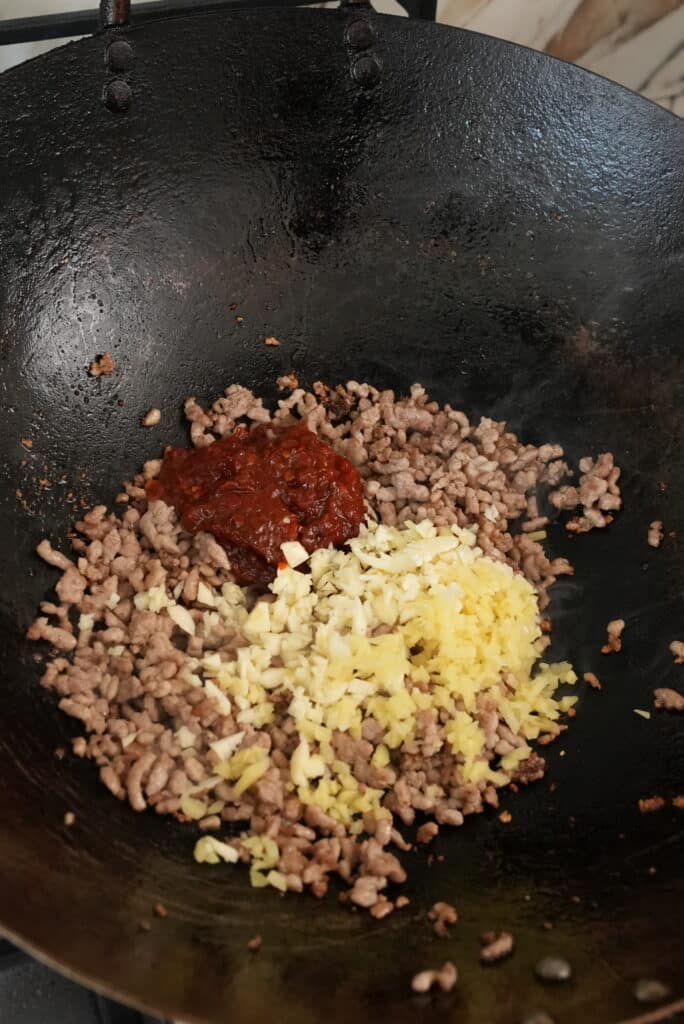
3. Make the Meat and Sauce Mixture
When the ground pork is browned, add minced garlic, minced ginger, and 2 tbsp of Doubanjiang, or Chinese chili bean paste.
Mix to incorporate; continue cooking on medium high heat for 2 minutes, or until the aromatics have softened and the chili paste has been cooked out of the Mapo Tofusauce.
Add the chili oil to the pork and sauce mixture and stir to combine.
Next, add 2 cups of high quality chicken stock, along with sugar, msg, dark soy sauce, Shaoxing wine, and ground Sichuan peppercorns. Mix well and increase the heat to high; bring the Mapo Tofu sauce to a boil.
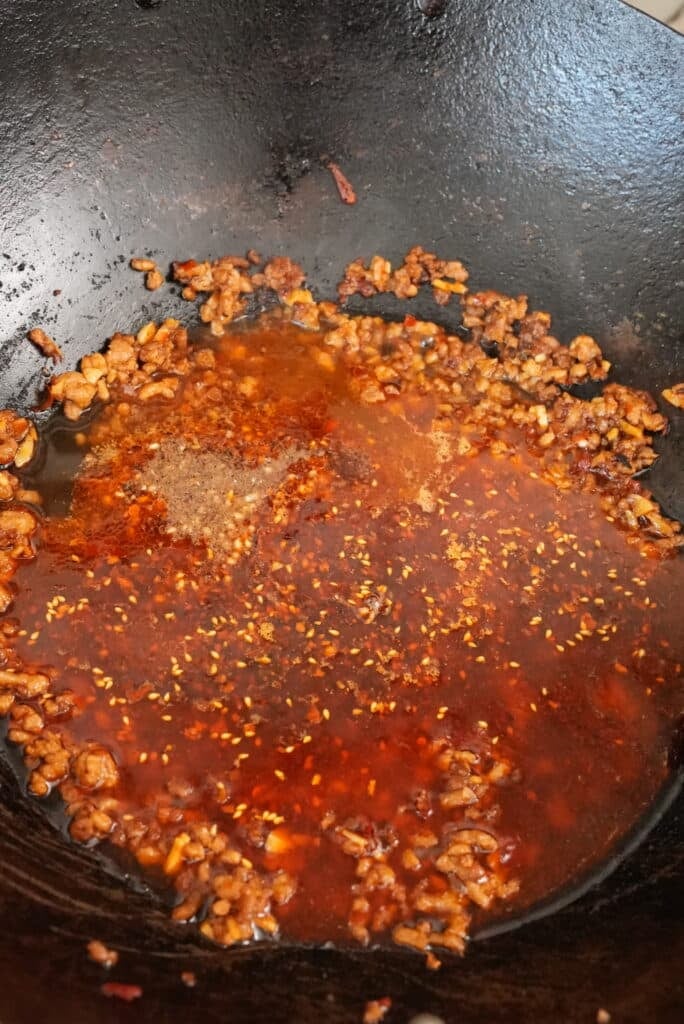
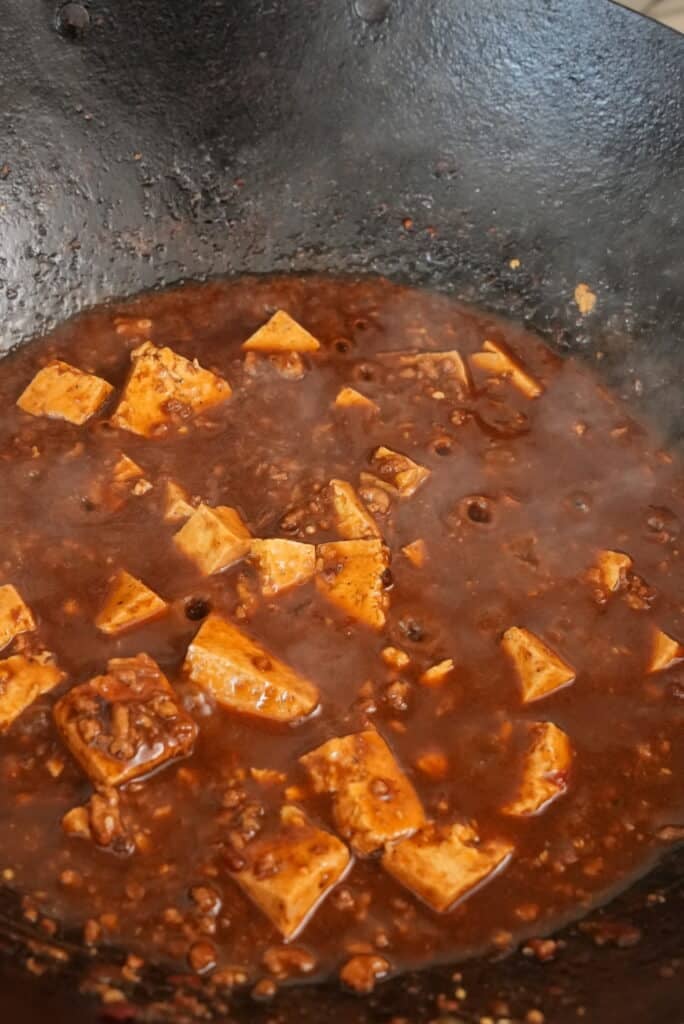
4. Add the Tofu and Cornstarch Slurry
Once the meat and sauce mixture is boiling, add the blanched tofu and simmer over medium heat for about 5 minutes. This is to let the tofu soak up all of the flavors of the mixture.
Finally, give your cornstarch slurry a final mix before adding to the wok. Stir until the sauce has thickened to about the consistency of a gravy.
- If the Mapo Tofu sauce is too watery, add more cornstarch slurry.
- If the Mapo Tofu sauce is too thick, thin the sauce out with more chicken stock.
Serve with steamed rice, Smashed Cucumber Salad or copycat Din Tai Fung Cucumber Salad, and enjoy!

PRO TIPS
Expert Tips + Storage
Tofu Tips – Restaurants use different levels of firmness for their Mapo Tofu, so there is no right or wrong answer – pick the right tofu for YOUR preference.
- I recommend using firm or extra firm tofu – I like my tofu to maintain its shape while cooking in the Mapo Tofu.
- If you prefer a softer texture, go with silken or soft tofu. Note that the tofu will likely fall apart.
- Medium tofu is a great compromise if you want a tofu that is softer but holds up in the Mapo Tofu.
Blanch Your Tofu – This is OPTIONAL but I like to blanch my tofu after cubing it. Blanching my tofu helps firm it up even further, which gives it a nicer texture when cooked in the Mapo Tofu sauce. You can skip this if you want!
Getting the Right Consistency – If you are almost done cooking your Mapo Tofu but do not think it’s the right consistency, follow these two tips:
- If the Mapo Tofu sauce is too watery, add more cornstarch slurry.
- If the Mapo Tofu sauce is too thick, thin the sauce out with more chicken stock.
Storage – Mapo Tofu can be stored in an airtight container in the refrigerator for 3-4 days. The flavors will continue to develop and meld together, so you may find that the leftovers taste even better than when it was fresh!
You can reheat this in the microwave or in a pan or pot over medium heat. If it’s too thick, add a little bit of chicken stock to loosen it up to your desired consistency.
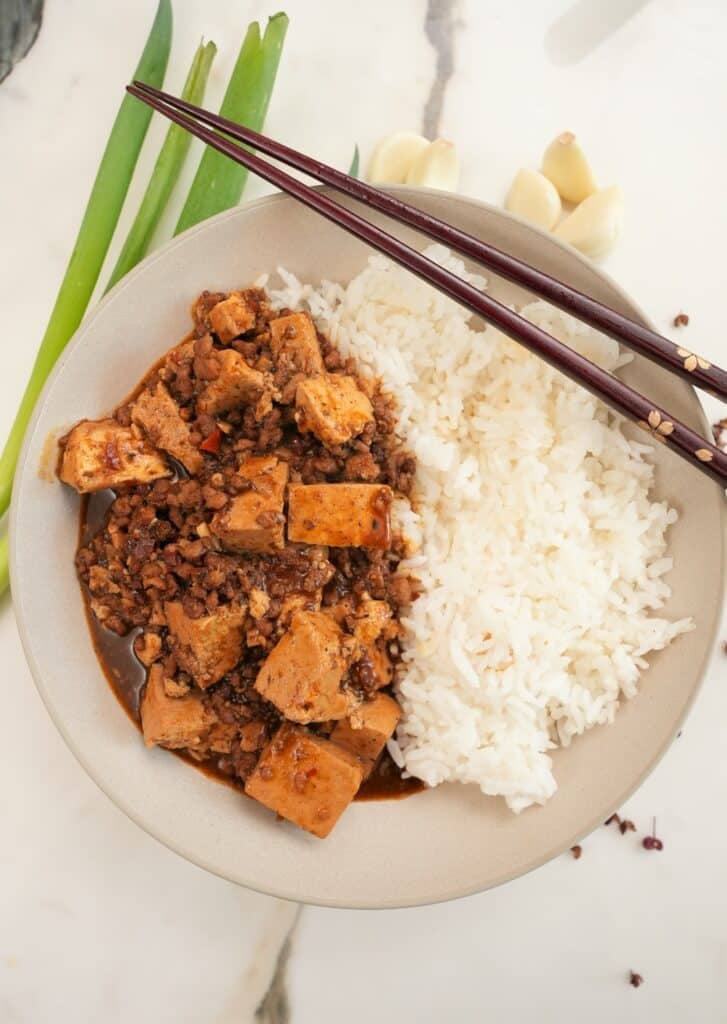
If you tried this Mapo Tofu or any other recipe on my website, please leave a 🌟 star rating and let me know how it went in the comments below!
Mapo Tofu
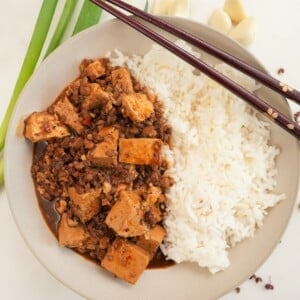
Ingredients
- 1 lb firm or extra firm block tofu, cut into 1" – 1.5" cubes, depending on your preference
- 8 oz ground pork
- 2 tbsp doubanjiang (chili bean paste)
- 4 cloves garlic, minced
- 1 tbsp ginger, minced
Sauce
- 1/3 cup chili oil, adjust to your spice preference
- 1 tbsp toasted ground sichuan peppercorn
- 1 tbsp sugar
- 1/4 tsp msg
- 1 tsp dark soy sauce
- 1 tbsp shaoxing wine
- 2 cup chicken stock
- salt to taste
Cornstarch Slurry
- 1 tbsp cornstarch
- 1/4 cup water
Instructions
- Cut the tofu block into desired width. I prefer bigger pieces so I slice the block in half width-wise then into 2 inch cubes. To a pot of boiling water, add 1 tbsp kosher and the tofu and blanch until just before the water begins to boil (2-3 min). Drain and set aside.
- Over high heat, fry ground pork in 2 tbsp neutral oil, or until the water has evaporated from the meat and fat is rendered and slightly crispy, about 3-4 minutes. Add in doubanjiang, garlic, and ginger – continue cooking until aromatics have softened, chili bean paste has cooked through, and oils have been extracted, about 2-3 minutes.
- To the pork, add chili oil, chicken stock, toasted sichuan peppercorn, dark soy, shaoxing wine, sugar, and msg. Stir to combine.
- Add back your tofu and simmer for 5 minutes over medium heat.
- Add your cornstarch slurry to thicken and stir until it reaches your desired consistency. Salt to taste. Garnish with fresh scallions and serve with rice – enjoy!
Video
Notes
- I recommend using firm or extra firm tofu – I like my tofu to maintain its shape while cooking in the Mapo Tofu.
- If you prefer a softer texture, go with silken or soft tofu. Note that the tofu will likely fall apart.
- Medium tofu is a great compromise if you want a tofu that is softer but holds up in the Mapo Tofu.
- If the Mapo Tofu sauce is too watery, add more cornstarch slurry.
- If the Mapo Tofu sauce is too thick, thin the sauce out with more chicken stock.
Nutrition
Nutrition information is automatically calculated, so should only be used as an approximation.

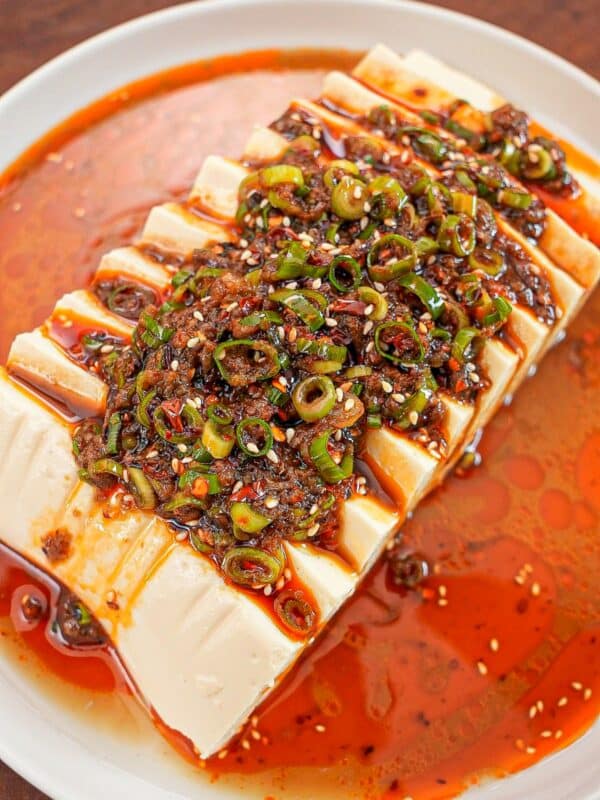
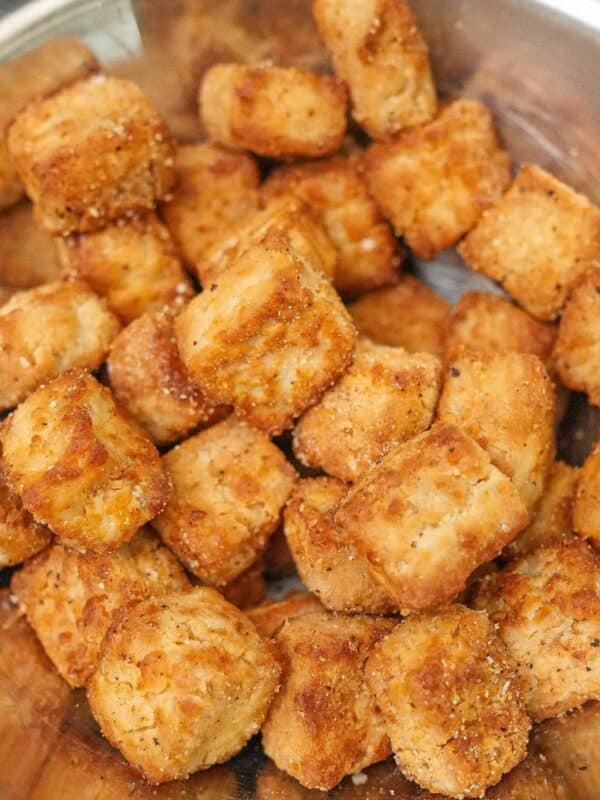
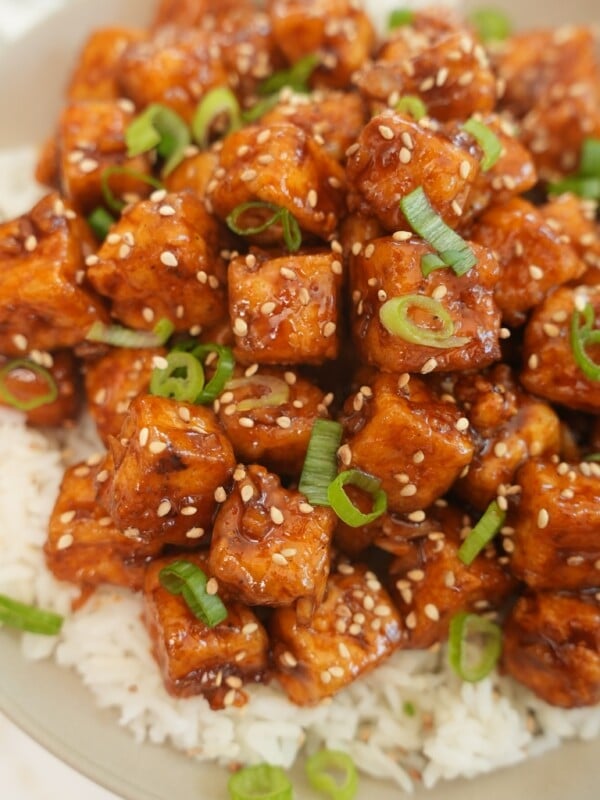
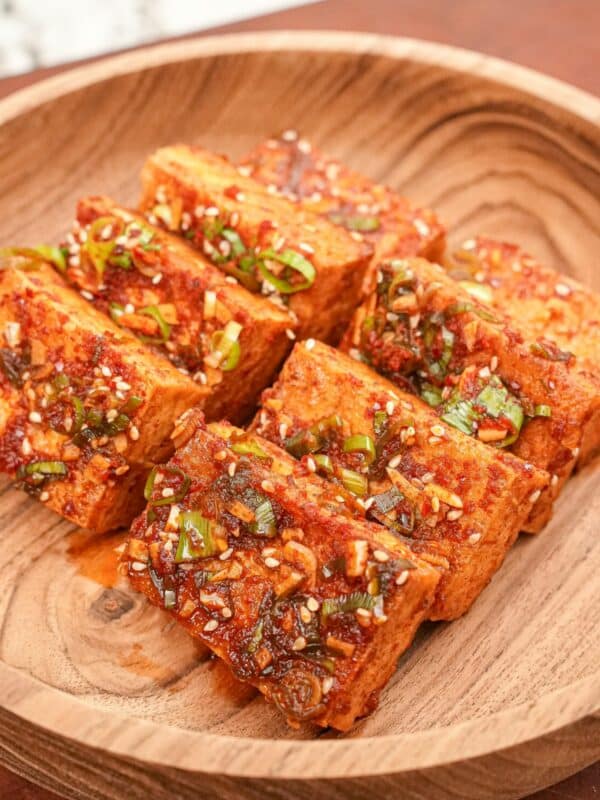







Definitely authentic and better than restaurants!